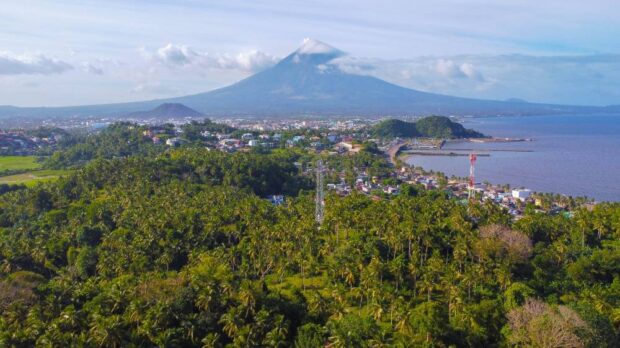
MAJESTIC BUT DANGEROUS Mount Mayon towers above Legazpi City, the provincial capital of Albay and the regional center of Bicol, belying the danger that lurks on its slopes as the volcano remains restive. This photo was taken on Friday, two days before Mayon’s steam-driven eruption. —MARK ALVIC ESPLANA
LEGAZPI CITY—Prohibitions on human activities, including farming, were strictly enforced within the six-kilometer radius permanent danger zone (PDZ) of Mayon Volcano after it spewed over a kilometer-high steam and ash columns on Sunday.
In an advisory on Monday, Albay Gov. Edcel Greco Lagman said all barangay disaster management officials were ordered to monitor their areas close to the volcano as another eruption may still occur since the volcano was still on alert level 2.
Under alert level 2, activities like farming, mountain climbing, orchid picking, hiking, camping and other recreational activities were not allowed inside the PDZ.
The Albay Public Safety and Emergency Management Office also advised local governments—particularly the towns of Camalig, Guinobatan, Daraga, Sto. Domingo and Malilipot, and the cities of Tabaco, Legazpi and Ligao—to implement strict monitoring around the volcano, especially along the river channels near the Mi-isi, Bonga and Basud gullies.
No earthquakes
The Philippine Institute of Volcanology and Seismology (Phivolcs) recorded Mayon’s phreatic or steam-driven eruption at 4:37 p.m. on Sunday. It lasted for four minutes and nine seconds, generating a 1,200-meter-tall plume that drifted to the southwest. So far, only Libon town has reported an ashfall incident.
Phivolcs Director Teresito Bacolcol said the phreatic eruption was triggered by water and hot volcanic materials found on the crater from last year’s eruption.
In the Monday bulletin, Phivolcs recorded zero volcanic earthquakes and moderate emissions drifting northwest.
Bacolcol said the absence of volcanic earthquakes would mean that there was no new supply of magma ascending to the surface. “Volcanic earthquakes would indicate magma squeezing its way to the surface, fracturing rocks and producing earthquakes in the process,” he said in a text message on Monday.
READ: Mayon Volcano spews 1.2-km ash column
Mayon Volcano’s status was raised to alert level 3 on June 8, 2023, after it exhibited continuous lava flows, pyroclastic density currents and rockfall events, forcing more than 2,000 families to evacuate from the eight towns and cities in the province. It was lowered to alert level 2 on Dec. 8 last year after a decline in the volcano’s seismic activity.
Monitoring
In Camalig town, 55 families (211 individuals) in Barangay Anoling were closely monitored due to the possibility of another phreatic eruption and other volcanic activities. These families stayed in an evacuation center for almost six months until they were allowed to return to their village, located near the 5-km danger zone of the volcano, in December last year.
Camalig Mayor Carlos Irwin Baldo Jr., in a private chat on Monday, said that Barangay Anoling officials were directed to monitor the residents and restrict the activities on the upper slopes of the volcano because even if they were allowed to return home, they still could not enter the more dangerous slopes.
In the event of an explosive eruption, these families would be easily evacuated as they were living near accessible areas, Baldo said. INQ